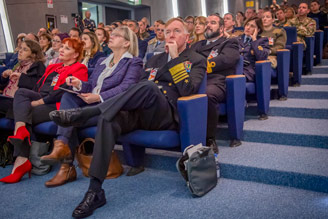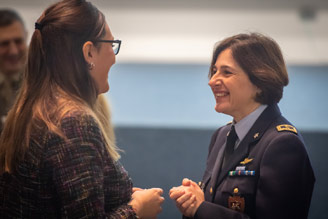''Peace is more likely to prevail when women are empowered and intrinsically engaged in its creation''
Interview with Admiral James G. Foggo III, Commander of JFC Naples
- English
- French
After February’s conference, the WPS team approached Admiral James Foggo, Commander of JFC Naples, for a few follow-up questions. Admiral Foggo has long been a staunch supporter of the Women, Peace and Security mandate in and beyond NATO, and he has made the integration of gender perspectives in all of JFC Naples’ work an absolute priority. Thank you Admiral, for your personal dedication to this topic, and for all your efforts to advance the principles of gender equality at NATO.

The mission of Allied Joint Force Command Naples is to prepare for, plan and conduct military operations in order to preserve the peace, security and territorial integrity of Alliance member states throughout SACEUR’s Area of Responsibility and beyond. How important is the Women, Peace and Security mandate to the successful implementation of that mission?
Thank you for affording me the opportunity to reflect once again on this very important topic. I have been passionate in working to inculcate an instinctive inclusion of the WPS mandate in the planning and execution of all our JFC Naples missions. And not only should it be an inherent part of the planning process, but we must also strive to live those ideals on a daily basis in all the work we do here in the Headquarters.
Conflict disproportionately impacts women and girls and I am determined that wherever in the world our JFC Naples missions are engaged, we bring a gender lens to our work and encourage our partner nations to do the same. This is essential as gender equality is not simply a matter of social justice but also key to a sustainable security landscape. Put simply, peace is more likely to prevail when women are empowered and intrinsically engaged in its creation.
When did you first become aware of the importance of integrating gender into operations; what was the “a-ha” moment when you realized there was a practical reason for promoting gender in operational tasks?
That gender is a crucial consideration in operational tasks should not be a surprise to the thinking military person, but I regret that only in the last few years has it become part of the formal planning agenda rather than an implied task. We have the great work of the UN to thank in this regard, with UNSCR 1325. In fact, 2020 marks the 20th anniversary of the passage of UNSCR 1325, calling for the full inclusion of women in peace and security initiatives. As we celebrate this milestone, it’s also an opportunity to review and refresh our approach, ensuring that we lead from the front on this while always committing to its tenets through our actions. I am proud that NATO was an early adopter, and grateful for Clare Hutchinson’s leadership of a policy that perfectly reflects our shared values of individual liberty, democracy, human rights and, of course, our obligations under the Charter of the UN.
“2020 marks the 20th anniversary of the passage of UNSCR 1325, calling for the full inclusion of women in peace and security initiatives.
As we celebrate this milestone, it's also an opportunity to review and refresh our approach, ensuring that we lead from the front on this while always committing to its tenets through our actions"
As for an ‘a-ha’ moment, well I’m the husband and father of professional women who have excelled in their respective fields, and all my career I’ve served alongside and worked with remarkable women from every nationality and background. A world where women are empowered is a better, more stable, civilized, and compassionate one and that is something we must all strive for, not simply with rhetoric but through meaningful action.
Your work with FemWise - a network of African women involved in conflict prevention and mediation created in 2017 has been very successful, and there are many good practices to capture. What can NATO learn from your collaboration with women’s groups like FemWise and what more should we do to reach out to women in the Global South?
I am enormously proud of the partnership that JFC Naples has with the incredible women of FemWise Africa through the auspices of the African Union. Many of these women, all of whom are leaders in their fields, have personal experience in conflict prevention and resolution. It is important that we help give them a voice and also take the opportunity to learn from them. As you know, the principles of integration, inclusiveness and integrity guide NATO’s implementation of the WPS Action Plan. Through the lens of experience of the FemWise cohort, we are able to bring substance to our actions rather than simply a philosophical approach to the WPS agenda. Our goal here at JFC Naples, in partnership with the African Union and their FemWise organization, is to combat the root causes of regional instability which lie in poor governance and a fragile or compromised rule of law. We are doing this together. This requires collaboration across all elements of civil society and I see the FemWise network as fundamental to that; this model of working together is one that could be applied more broadly across the entirety of NATO. Our JFC Naples Hub for the South will continue its work with the African Union and FemWise to ensure that women’s voices are heard in all that we do in the region.

JFC Naples recently hosted a successful workshop on Conflict-Related Sexual Violence. What were your takeaways from hearing some of the conversations and what more can NATO do to protect and support women and girls, men and boys, from sexual violence in conflict?
It was a great honor to host the Women, Peace & Security workshop on Conflict-Related Sexual Violence at our Headquarters in Naples. The workshop sought to enhance understanding of the WPS agenda in the preparation, planning and conduct of NATO and NATO-led operations. We heard from an array of speakers and I will not deny that much of that testimony was difficult listening. A theoretical approach to the tenets of the WPS agenda is one thing, to hear the harrowing details of the experiences of the most vulnerable in our societies during conflict and the evil that man is capable of wantonly inflicting is another. The lived and ongoing trauma of the Yazidi people in Iraq was detailed so cogently by representatives from Nadia’s Initiative, a charity founded by Ms. Nadia Murad, co-recipient of the Nobel Peace Prize in 2018, which is dedicated to rebuilding communities in crisis and advocating globally for victims of violence.
This account was a salutary example of how NATO must strive to combat sexual violence both in conflict and in the post-conflict landscape since an apparent return to relative normality does not mean that suffering is not still being inflicted on a population but rather that it tends to be more hidden.
NATO HQ’s Women, Peace and Security team recently released a report on the role and efficacy of Gender Advisers. You have worked very closely with your Gender Advisers and have demonstrated how such a role can be effective. How do you think Gender Advisers and Gender Focal Points can deliver most assistance and guidance?
We can’t expect high standards of governance and adherence to equality in other organizations if we aren’t wholeheartedly living the values ourselves. Our GENAD holds a key, full-time role in the Naples HQ and is a principal participant in an array of planning and operational delivery programs. He is also the link between the Headquarters and Ms. Clare Hutchinson, the Secretary General’s Special Representative for Women, Peace and Security. Clare has been an outstanding advocate for the WPS agenda and we greatly welcome her support of our work with FemWise and her wise counsel. I see Gender Advisers and Gender Focal Points as honest friends to the leadership of any organization, and that is why they must be empowered individuals. The rank is irrelevant - I am only interested in their insight. And my GENAD is not responsible for the implementation of a policy: that lies with commanders and leaders which is why I want to hear it how it is, irrespective of whether that’s good or bad. Speaking truth to power is fundamental to the work of the GENAD.
Your term as COM JFC Naples is soon coming to an end. What advice do you have for your successor, how s/he can continue to advance the Women, Peace and Security agenda at NATO and in Naples?

It has been the honor of my life to lead JFC Naples and to work with the Italian people in this beautiful country; I know that my successor will be served by an outstanding staff, military and civilian, all of whom are committed to our Mission and to doing good in this world. The Women, Peace and Security agenda is now fundamental in the work of this Headquarters. I am proud that our partnership with the African Union, with FemWise, and with global ambassadors and advocates for women’s empowerment sets a standard for others to emulate. I know that the work will continue and I look forward to the day that gender is no longer a distinctive part of operational planning but instead a given, something that we instinctively incorporate into the tapestry of our missions.
This story is part of the Spring 2020 WPS Bulletin. Download the full edition here (ENG / FRE)
